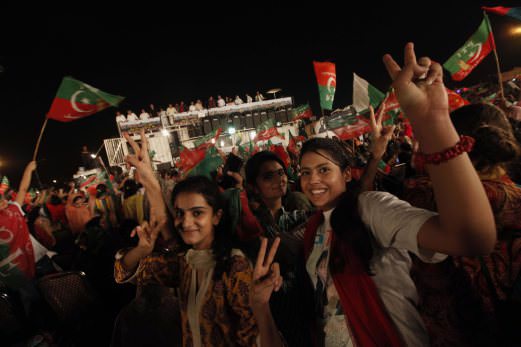ISLAMABAD: The party of Pakistani opposition politician Imran Khan held talks with the government aimed at ending tense protests on Friday, even as it submitted the resignations of 34 lawmakers from parliament.
Former cricketer Khan and populist cleric Tahir-ul-Qadri have led thousands of supporters demonstrating outside the legislature this week calling for Prime Minister Nawaz Sharif to go.
Khan’s Pakistan Tehreek-e-Insaaf (PTI) party restarted the dialogue on Friday through contact with the governor of Punjab, Pakistan’s most populous province, after calling off the talks a day earlier with the insistence that Sharif resign first.
“The government delegation explained its point of view on our demands and our side shared its concerns on (the) government’s position,” PTI vice chairman Shah Mehmood Qureshi told reporters after the meeting, adding the next round of talks would be held on Saturday.
Khan insists the May 2013 general election, which swept Sharif to power in a landslide, was rigged, though observers rated it free and credible.
Sharif’s Pakistan Muslim League-N (PML-N) party insist he will not quit and accuse the protesters of undermining the country’s fragile democracy.
Qadri and Khan’s protest movements are not formally allied and have different goals, beyond toppling the government. But their combined pressure – and numbers – have given extra heft to the rallies.
If one group were to reach a settlement with the government and withdraw, the other’s position would be significantly weakened.
Qureshi also submitted the resignations of PTI lawmakers in the National Assembly, the lower house of the federal parliament, to the house’s speaker on Friday.
“According to the decision of the PTI’s core committee, the resignations of our members have been submitted today,” Qureshi told reporters.
PTI is the third largest party in the National Assembly with 34 seats.
Parliamentary speaker Ayaz Sadiq told private Geo television he had already left for the day when Qureshi delivered the letters of resignation to his office, but would open them and verify the contents on Monday, ultimately triggering by-elections unless they are withdrawn.
The standoff has raised fears of possible military intervention – the country has seen three coups since its creation in 1947 – though analysts say the army is more likely to use the crisis to assert influence behind the scenes than stage an outright power grab.
Neither movement has mobilised mass support beyond their core followers and opposition parties have shunned Khan’s call to unseat the government and begin a campaign of civil disobedience.
Maulana Fazalur Rehman, chief of the religious Jamiat Ulema-e-Islam (JUI-F) party said the protests had no support from the majority of Pakistan’s 180 million population.
“They have been isolated and people of Pakistan have rejected them – there are maximum 5,000 to 6,000 people combined with them at night,” he told AFP.
Despite rumours that the military had some hand in the protests, the Minister for Water and Power Abid Sher Ali, a PML-N stalwart, insisted there was “no pressure on us from any state institution to resign.”
“It is the imagination of some lawless and outside elements camping out there,” he told AFP.
But if a full-blown coup d’etat looks unlikely – such a move could jeopardise billions of dollars in foreign assistance and trade deals – analysts say the crisis will leave Sharif weakened.
“The protests rocking Islamabad threaten to upend the constitutional order, set back rule of law and open the possibility of a soft coup, with the military ruling through the backdoor,” the International Crisis Group wrote.
Sharif has a history of testy relations with the military – his second term as prime minister ended abruptly in 1999 when then-army chief Pervez Musharraf seized power in a coup.
His government is thought to have angered the military by pursuing criminal cases against Musharraf dating back to his 1999-2008 rule, including treason charges.
The PM has also pursued better relations with arch-rivals India, whose perceived military threat is an important justification for the Pakistani army’s large budget allocation.
Retired general Talat Masood, a defence and political analyst, said the ultimate outcome was likely to be “real power then will further going to the hands of the military.”Khan–AFP
-nst








